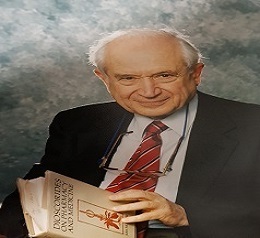Scholars 5th Edition
Frontiers in Chemistry Forum
THEME: "Frontiers in Chemical Sciences for Health, Energy, and Sustainability"
 27-28 Mar 2023
27-28 Mar 2023  Crowne Plaza Ealing, London, UK & Online
Crowne Plaza Ealing, London, UK & Online THEME: "Frontiers in Chemical Sciences for Health, Energy, and Sustainability"
 27-28 Mar 2023
27-28 Mar 2023  Crowne Plaza Ealing, London, UK & Online
Crowne Plaza Ealing, London, UK & Online 
the Hebrew University of Jerusalem
Title: Endogenous anandamide-like compounds
RM
was born in Sofia, Bulgaria in 1930. His father was a physician and head of the
Jewish hospital in Sofia. RM went to an
American Grade School in Sofia for 4 years until it was closed by the
pro-German government.
From
1942, for over 2 years – during the 2nd world war - his family lived in small
villages in the Balkans. His parents believed that the family is safer there.
Nevertheless his father was taken to a concentration camp for part of this
time.
RM
immigrated to Israel in 1949. He studied biochemistry at the Hebrew University
in Jerusalem (M.Sc.) and the Weizmann Institute in Rehovot (Ph.D.) He spent a
year in New York, at the Rockefeller Institute and returned to the Weizmann
Institute in 1960. He worked on the chemistry of various natural products. He
initiated his work on hashish, which he received from the Police. In 1966 he
moved to the Hebrew University, where he became a full professor in 1972. From
1979 to 1982 he was Rector (Academic Head) of the Hebrew University. He retired
in 2000 but continued his research. He still has a lab with 3-4 post-doctoral
researchers.
His
work has been mostly on the chemistry of natural products, the best known being
on cannabinoids. In collaboration with numerous colleagues in Israel and abroad
he has also published in pharmacology and on clinical trials.
He
has published about 470 scientific papers and has received numerous national
and international prizes, including the Israel Prize – the most prestigious
Israeli Prize – as well as a prize from the US National Institutes of Health.
He is a member of the Israel Academy of Sciences, where he headed the Natural
Sciences section from 2007 to 2013.
Over the last few decades research on the cannabinoids has gone
through several distinct phases: 1) research on the plant cannabinoids, mostly
on tetrahydrocannabinol (THC) and cannabidiol (CBD); 2) research on the endogenous
cannabinoids, mostly on anandamide and 2-arachidonoyl glycerol (2-AG); and 3)
research on anandamide-like endogenous fatty acid amides with amino acids and
ethanol amines.
Thousands of publications have been published on the plant cannabinoids
and some of them are already in use as therapeutic drugs. Of particular
interest is the non-psychotropic cannabinoid, CBD;
it is an approved anti-epileptic drug and is being evaluated in many other
therapeutic areas (for example, inflammation, cancer, bone fractures and auto-immune
diseases). Similarly, cannabidiolic
acid methyl ester, a stable synthetic derivative of cannabidiolic acid (CBDA), a major constituent of Cannabis sativa, proved
to be effective in suppressing nausea and anxiety in rats and
reducing depression-like behavior in animal models of depression.
Endogenous fatty acid – amino acid amides have been shown to be of
major importance in a large spectrum of biological functions and diseases.
Thus, oleoyl serine, is an
anti-osteoporotic molecule, anandamide and arachidonoyl serine possess
antimicrobial activity against methicillin resistant S. aureus strains, arachidonoyl
serine exerts neuroprotective effects
following traumatic brain injury and oleoyl glycine prevents both nicotine conditioned place
preference – an addiction animal model - and nicotine
withdrawal-associated behaviors in mice and thus may possess efficacy in
treating nicotine addiction.
We can expect therapeutic advances in all areas.